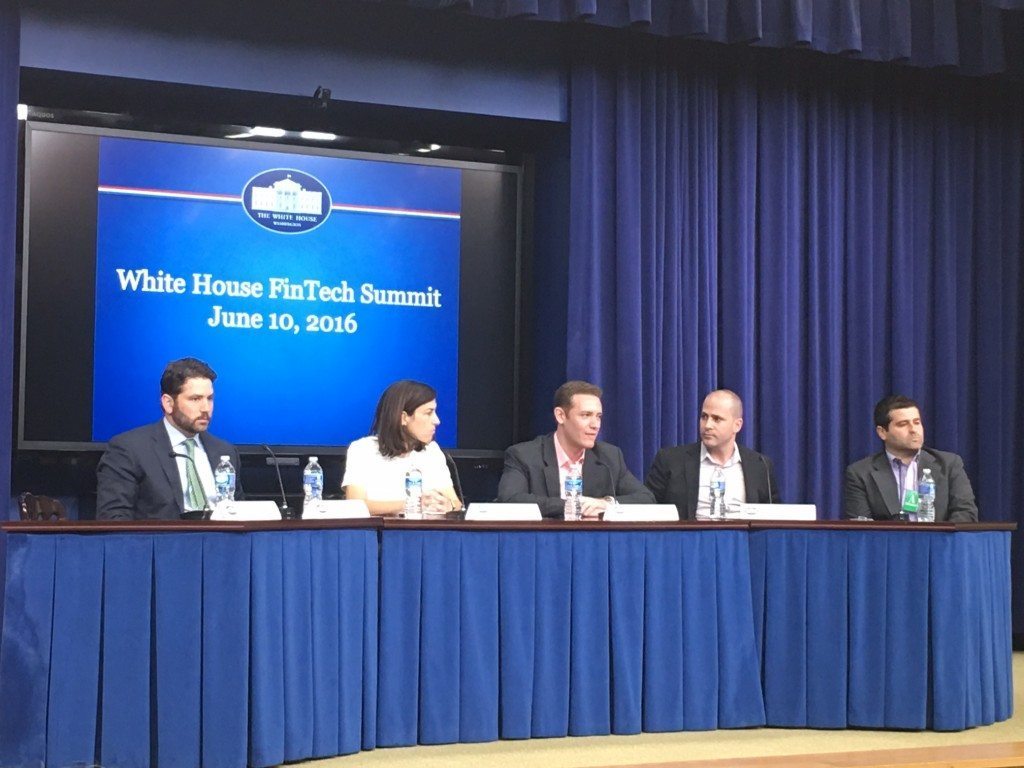
The second White House panel discussion focused upon small business funding, an area close to my heart as it’s an area that has exploded with opportunity thanks to FinTech. I often reflect that FinTech is not disrupting or destroying banking, but that FinTech is augmenting banking by serving markets previously unserved or underserved. The unserved markets are those who are unbanked how now have mobile financial inclusion and mobile wallets (5 billion people); the underserved are the underbanked and Small to Medium Enterprises (SMEs) are definitely underserved. Most of the time they go to a bank to get a loan and are told to get lose: no track record, no history, no credit rating, no data. Banks have to judge a business based upon guess work, especially start-ups, and so the start-up market has been underserved.
These discussions were led by Mark Walsh, Head of Innovation and Investment with the US Small Business Administration, and comprised a panel of:
From left to right: Sam Hodges, Co-Founder and CEO of Funding Circle; Jessica Milano, Deputy Assistant Secretary for Small Business, Community Development and Housing, US Department of the Treasury; Dana Wagner, General Counsel, Square; Jon Zanoff, Founder of Empire Startups; and Slava Rubin, Co-Founder and Chief Business Officer of Indiegogo
The backdrop to this panel was the White Paper released last month by the Department of Treasury, and managed by Jessica Milano: Opportunities and Challenges in Online Marketplace Lending. The White Paper was the result of widespread consultation with key players in the industry, and found several common themes:
- Use of data and modelling techniques for underwriting is an innovation and a risk;
- There is opportunity to expand access to credit;
- New credit models and operations remain untested;
- Small business borrowers will likely require enhanced safeguards;
- Greater transparency can benefit borrowers and investors;
- Secondary market for loans is undeveloped; and
- Regulatory clarity can benefit the market.
The paper also made several recommendations to the federal government and private sector participants to follow:
- Support more robust small business borrower protections and effective oversight;
- Ensure sound borrower experience and back-end operations;
- Promote a transparent marketplace for borrowers and investors;
- Expand access to credit through partnerships that ensure safe and affordable credit;
- Support the expansion of safe and affordable credit through access to government-held data; and
- Facilitate interagency coordination through the creation of a standing working group for online marketplace lending.
In summary, SME funding through FinTech is all about all about data driven underwriting and algorithmic credit rating that is creating new markets to enable SMEs to grow and flourish.
I asked what impact SME funding through alternative financial providers was having on the economy, and the report shows some of the scope of this market.
While online marketplace lending is still a small component of the lending market, it is a fast-growing sector that is continuously evolving. The U.S. market is currently driven by prime and near-prime consumer unsecured loans, followed by small business loans, and student loans. Market analysts identify a $1 trillion addressable market for online marketplace lenders (excluding mortgages), and estimate loan origination volumes could reach $90.0 billion by 2020.
Online marketplace lenders are also beginning to offer mortgage and auto loans, although this is still a small share of the total market. Companies are marketing directly to consumers looking to refinance credit cards, small businesses underserved by financial institutions, students able to refinance existing student loans, and individuals buying cars using nonbank loans.
Strong interest by institutional investors, venture capital, financial institutions, and hedge funds has enabled the rapid growth of this market. On the equity side, from Q4 2014 to Q4 2015 venture capital-backed online marketplace lenders raised $2.7 billion across 36 deals in the U.S. Investor interest led to the first initial public offerings (IPOs) in the marketplace lending industry with Lending Club and OnDeck raising $1.0 billion and $230.0 million, respectively, in 2014. Additionally, the entrance of institutional investors has stimulated the creation of an ecosystem of information services, risk analytics, and trading technology companies focused on online marketplace lending.
On the debt side, online marketplace lending whole loans emerged as an attractive investment for investors searching for diversification and high yield. Increased investor demand stimulated the market for securitization of whole loans issued by online marketplace lenders, with the first unrated securitization transaction pricing in 2013 and first rated securitization transaction pricing in 2014. Direct lender and platform, consumer and small business online marketplace lenders alike are securitizing portfolios of loans as sources of funding. By the end of 2015, the total volume of securitization reached over $7.0 billion, with over 40 transactions since 2013.
With that backdrop, the panel got to it, with Slava Rubin particularly articulate about the problem that crowdfunding solves. He emphasised that it used to be that a start-up had to go to a bank to get money to get going. It also had to spend a considerable part of that money on marketing to reach their target audience via media. Indiegogo collapses that start-up structure into one process, where your market and your customers provide you with the funds direct to get going. Many banks would not fund start-up SMEs, because they don't have the data to take the risk. Crowdfunders turn that on its head, as the amount of funding in a crowdfunded business is directly reflected by the demand from the marketplace and customer. In other words, the unknown data the bank is dealing with – what is the demand for this product – is sourced upfront before the business gets started through sites like Kickstarter, Indiegogo, Crowdcube and Seedrs.
Slava called the cycle of gauging market demand through market funding as investments in pre-revenue companies and a big change that’s coming to the US markets is the move from investing in established business through equities to gaining equities in pre-revenue companies. Again, last month, the SEC approved crowdfunding equities although the implementation is limited. For example, your equities fundraising can only be made in the state that you reside. That’s kind of like equities fundraising off the internet, as you cannot get funding outside the firms’ home state, according to CrowdFund Insider.
Anyways, back to Indiegogo who know exactly how difficult it is to get a start-up started as they were rejected by 93 Angel investors and Venture Capital funds during their first three years. The company had to bootstrap their product to get going, and so only worked in English and PayPal but were being used globally by many countries within two years because they were providing a service people really needed. Indiegogo now sends money to around 70 countries, and believe that the power of their model was also proven by internet-based market demand from the crowd. For example, even countries that don’t speak English as their primary language were using Indiegogo to get firms financed, as traditional financing would not allow.
There were further discussions about regulations with Sam Hodges saying that the UK government gets it right by having specific regulations for the new marketplaces. Certainly the UK has been proactive in regulatory structures with specific approaches for loan and investment based crowdfunding. A key difference in the UK market is not only the regulatory approach, which is a single structure, but also the access to data because we have Companies House, a central data service of companies and directors that SME funders can access and use. This data is unavailable in the US markets with such ease, according to Sam.
Dana from Square highlighted that SMEs can also get business from companies like Square, PayPal and Lending Club if they have a track record with those firms. The fact SMEs can build a credit history with mobile Point of Sale (mPOS) systems is a key factor in changing the game. Examples include Square Capital, which delivered $400 million in cash advances to their merchants in 2015; PayPal which lends to merchants for free; and Lending Club who recently announced a partnership with Alibaba to provide a line of credit to SMEs importing from China.
These developments are all notable and illustrates exactly the point I made at the start: there is more access and opportunity today for start-ups and SMEs than ever before, because FinTech is serving these markets that previously could not be served effective by the banks.
Chris M Skinner
Chris Skinner is best known as an independent commentator on the financial markets through his blog, TheFinanser.com, as author of the bestselling book Digital Bank, and Chair of the European networking forum the Financial Services Club. He has been voted one of the most influential people in banking by The Financial Brand (as well as one of the best blogs), a FinTech Titan (Next Bank), one of the Fintech Leaders you need to follow (City AM, Deluxe and Jax Finance), as well as one of the Top 40 most influential people in financial technology by the Wall Street Journal's Financial News. To learn more click here...


